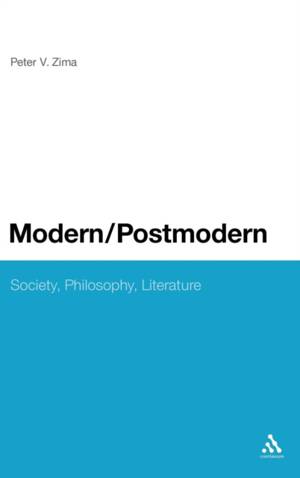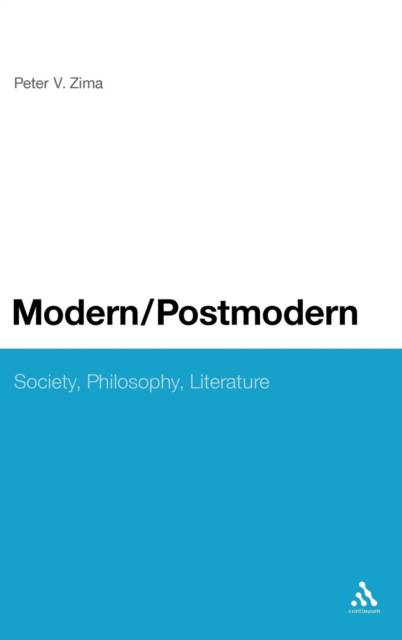
Door een staking bij bpost kan je online bestelling op dit moment iets langer onderweg zijn dan voorzien. Dringend iets nodig? Onze winkels ontvangen jou met open armen!
- Afhalen na 1 uur in een winkel met voorraad
- Gratis thuislevering in België vanaf € 30
- Ruim aanbod met 7 miljoen producten
Door een staking bij bpost kan je online bestelling op dit moment iets langer onderweg zijn dan voorzien. Dringend iets nodig? Onze winkels ontvangen jou met open armen!
- Afhalen na 1 uur in een winkel met voorraad
- Gratis thuislevering in België vanaf € 30
- Ruim aanbod met 7 miljoen producten
Zoeken
€ 181,95
+ 363 punten
Uitvoering
Omschrijving
Modern/Postmodern: Society, Philosophy, Literature offers new definitions of modernism and postmodernism by presenting an original theoretical system of thought that explains the differences between these two key movements. Taking a contrastive approach, Peter V. Zima identifies three key concepts in the relationship between modernism and postmodernism - ambiguity, ambivalence and indifference.
Zima defines modernism and postmodernism as problematics, as opposed to aesthetics, stylistics or ideologies. Unlike modernism, which is grounded in an increasing ambivalence towards social norms and values, postmodernity is presented as an era of indifference, i.e. of interchangeable norms, values and perspectives. Taking an historical, interdisciplinary and intercultural approach that engages with Anglo-American and European debates, the book describes the transition from late modernist ambivalence to postmodern indifference in the contexts of philosophy, literature and sociology. This is the ideal guide to the relationship between modernism and postmodernism for students and scholars throughout the humanities. Modern/Postmodern: Society, Philosophy, Literature offers new definitions of modernism and postmodernism by presenting an original theoretical system of thought that explains the differences between these two key movements. Taking a contrastive approach, Peter V. Zima identifies three key concepts in the relationship between modernism and postmodernism - ambiguity, ambivalence and indifference. Zima defines modernism and postmodernism as problematics, as opposed to aesthetics, stylistics or ideologies. Unlike modernism, which is grounded in an increasing ambivalence towards social norms and values, postmodernity is presented as an era of indifference, i.e. of interchangeable norms, values and perspectives. Taking an historical, interdisciplinary and intercultural approach that engages with Anglo-American and European debates, the book describes the transition from late modernist ambivalence to postmodern indifference in the contexts of philosophy, literature and sociology. This is the ideal guide to the relationship between modernism and postmodernism for students and scholars throughout the humanities.Specificaties
Betrokkenen
- Auteur(s):
- Uitgeverij:
Inhoud
- Aantal bladzijden:
- 328
- Taal:
- Engels
Eigenschappen
- Productcode (EAN):
- 9780826424020
- Verschijningsdatum:
- 7/10/2010
- Uitvoering:
- Hardcover
- Formaat:
- Ongenaaid / garenloos gebonden
- Afmetingen:
- 156 mm x 234 mm
- Gewicht:
- 630 g

Alleen bij Standaard Boekhandel
+ 363 punten op je klantenkaart van Standaard Boekhandel
Beoordelingen
We publiceren alleen reviews die voldoen aan de voorwaarden voor reviews. Bekijk onze voorwaarden voor reviews.











